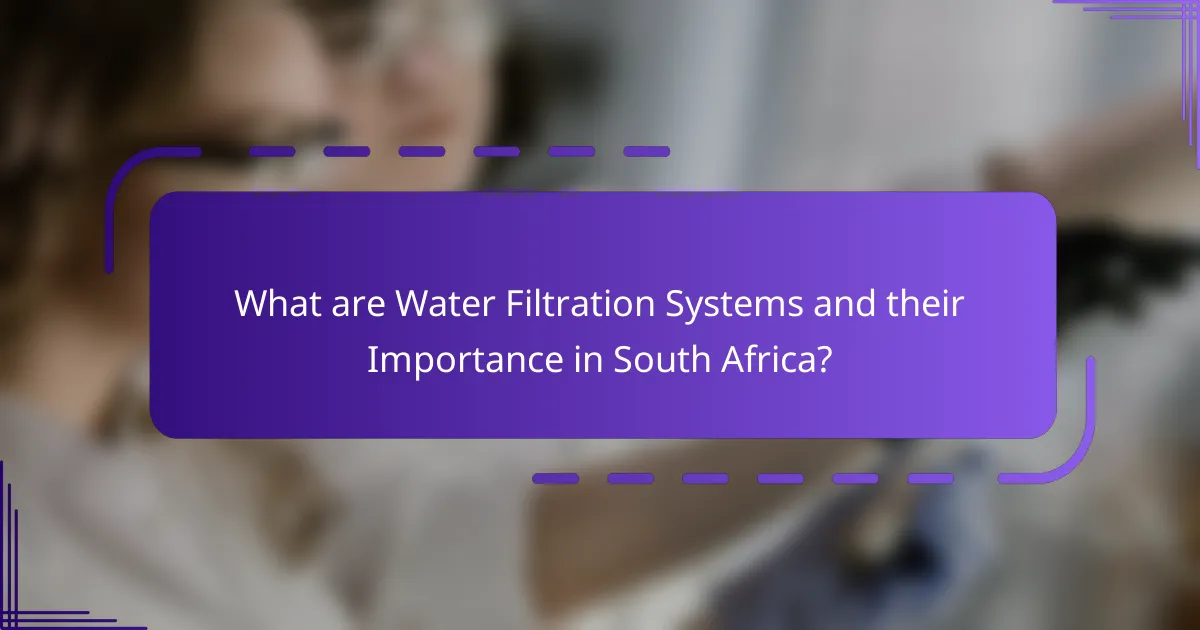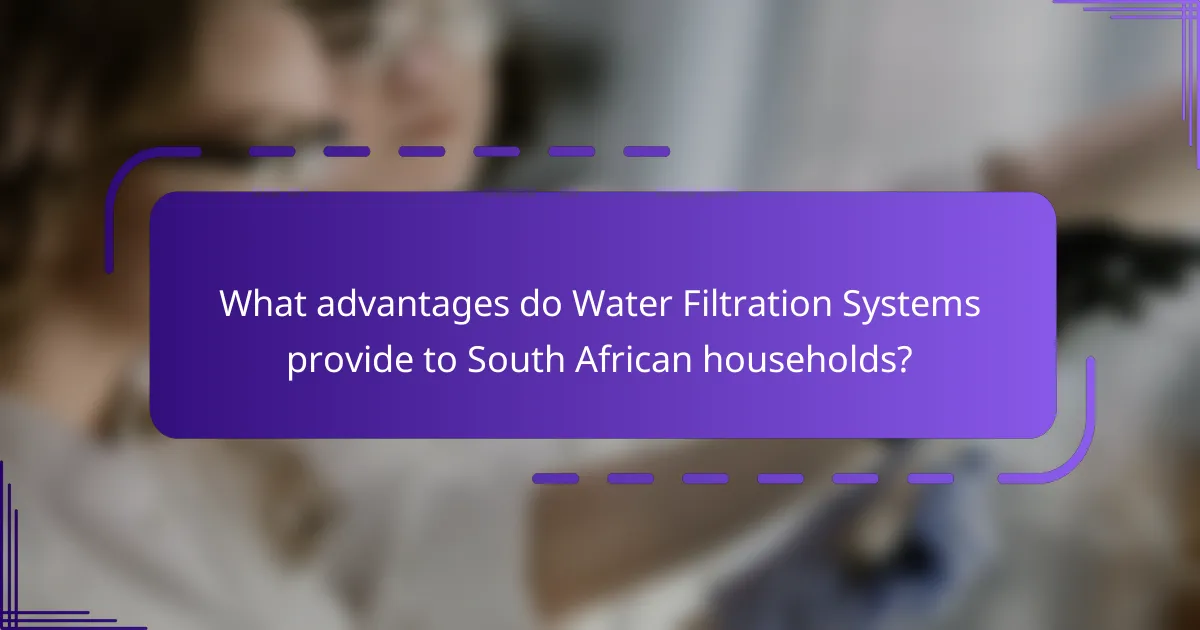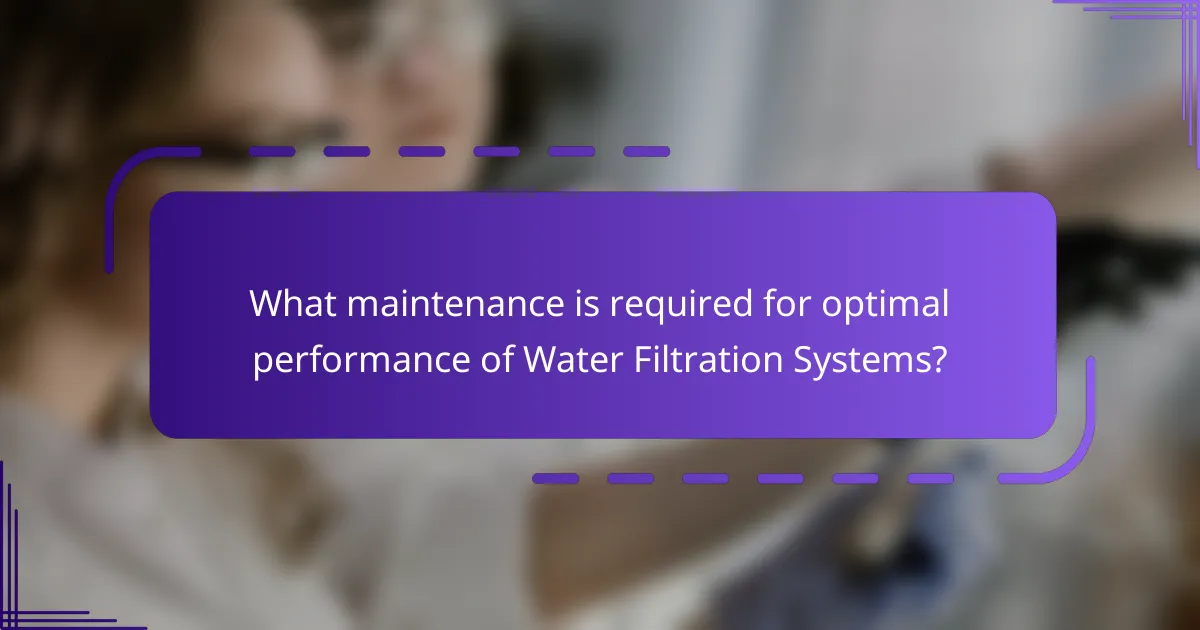Water filtration systems are essential devices that remove impurities and contaminants from drinking water, significantly impacting public health in South Africa. These systems address prevalent water quality issues, including pollution and pathogens, by improving water safety and taste. They offer numerous advantages to households, such as reducing health risks associated with contaminated water, enhancing palatability, and promoting environmental sustainability by decreasing reliance on bottled water. Proper maintenance, including regular filter changes and system sanitization, is critical for ensuring optimal performance and longevity of these filtration systems. Overall, the article explores the types, benefits, and maintenance practices of water filtration systems in South Africa, highlighting their importance in enhancing water quality and public health.

What are Water Filtration Systems and their Importance in South Africa?
Water filtration systems are devices designed to remove impurities and contaminants from water. They play a crucial role in ensuring safe drinking water in South Africa. Many areas in South Africa face water quality issues, including pollution and pathogens. Filtration systems help to purify water, making it safer for consumption. According to the World Health Organization, access to clean drinking water is vital for public health. In South Africa, water filtration systems can reduce health risks associated with contaminated water. They also contribute to better taste and odor of drinking water. Thus, these systems are essential for improving overall water quality in the region.
How do Water Filtration Systems function?
Water filtration systems function by removing impurities from water through various physical and chemical processes. These systems typically use filters to capture particles, sediments, and contaminants. Common filtration methods include activated carbon, reverse osmosis, and UV treatment. Activated carbon filters adsorb chemicals and improve taste and odor. Reverse osmosis utilizes a semi-permeable membrane to separate contaminants from water. UV treatment kills bacteria and viruses using ultraviolet light. Each method targets specific impurities, ensuring cleaner water. Studies show that effective filtration can significantly reduce harmful substances like lead and chlorine.
What are the main components of Water Filtration Systems?
The main components of water filtration systems include filters, a housing unit, and a water supply connection. Filters can be made of various materials, such as activated carbon, ceramic, or reverse osmosis membranes. The housing unit contains the filter and connects to plumbing. A water supply connection allows water to enter the system for filtration. Some systems also include a storage tank for treated water. Additional components may consist of a faucet for dispensing filtered water and a pressure gauge to monitor system performance. These components work together to remove impurities and improve water quality.
How do these components interact to purify water?
Water filtration systems use various components to purify water. These components include filters, membranes, and chemical agents. Filters physically remove particles and sediments from the water. Membranes, such as reverse osmosis membranes, separate contaminants on a molecular level. Chemical agents, like activated carbon, adsorb impurities and improve taste.
The interaction between these components enhances overall purification. For instance, pre-filters may remove larger particles before water reaches the membrane. This prevents clogging and extends the membrane’s lifespan. Additionally, chemical agents can neutralize harmful substances, aiding in the effectiveness of physical filtration.
Studies show that multi-stage filtration systems significantly reduce contaminants. For example, a study by the Water Research Commission in South Africa found that such systems can remove up to 99% of specific pathogens and pollutants. This interaction ensures that the water is not only cleaner but also safer for consumption.
What are the common types of Water Filtration Systems available?
The common types of water filtration systems available include activated carbon filters, reverse osmosis systems, ultraviolet (UV) filters, and sediment filters. Activated carbon filters remove chlorine, sediment, and volatile organic compounds, improving water taste and odor. Reverse osmosis systems use a semi-permeable membrane to remove contaminants such as lead and nitrates. Ultraviolet filters disinfect water by using UV light to kill bacteria and viruses. Sediment filters capture dirt, rust, and other particles, protecting other filtration systems. Each type serves specific filtration needs, ensuring safer drinking water.
What are the differences between reverse osmosis and activated carbon filters?
Reverse osmosis (RO) and activated carbon filters are distinct water filtration methods. RO removes dissolved solids, contaminants, and impurities through a semipermeable membrane. This process can eliminate up to 99% of total dissolved solids (TDS) and is effective against a wide range of contaminants, including heavy metals and pathogens.
In contrast, activated carbon filters primarily target chlorine, sediment, and volatile organic compounds (VOCs). They work through adsorption, trapping impurities on the surface of the carbon. While effective for improving taste and odor, activated carbon filters do not remove dissolved minerals or salts.
The key differences lie in their filtration mechanisms and effectiveness against specific contaminants. RO systems are more comprehensive in contaminant removal, while activated carbon filters excel in enhancing water taste and reducing specific chemicals.
How do UV filters work to ensure water safety?
UV filters work by using ultraviolet light to disinfect water. The UV light penetrates the cell walls of microorganisms. This process disrupts their DNA, rendering them unable to reproduce. As a result, harmful bacteria, viruses, and protozoa are effectively killed or inactivated. Studies show that UV treatment can eliminate up to 99.99% of pathogens in water. This makes UV filters an effective solution for ensuring water safety. They are chemical-free and do not alter the water’s taste or odor. UV filters require regular maintenance to ensure optimal performance.

What advantages do Water Filtration Systems provide to South African households?
Water filtration systems provide several advantages to South African households. They improve water quality by removing contaminants such as chlorine, heavy metals, and bacteria. This leads to safer drinking water, reducing health risks associated with poor water quality. Additionally, filtration systems enhance the taste and odor of tap water, making it more palatable. They also contribute to environmental sustainability by reducing reliance on bottled water. Furthermore, these systems can be cost-effective over time, decreasing expenses on bottled water purchases. Regular use of water filtration systems can promote better hydration and overall health for families.
How do Water Filtration Systems improve health outcomes?
Water filtration systems improve health outcomes by removing contaminants from drinking water. These systems effectively eliminate harmful substances such as bacteria, viruses, and heavy metals. For example, studies show that activated carbon filters can reduce chlorine and lead levels significantly. Clean water supports better hydration, which is essential for overall health. Access to filtered water decreases the risk of waterborne diseases. In South Africa, where water quality can be compromised, filtration systems are crucial. They help ensure safe drinking water, leading to fewer health issues. Evidence indicates that communities using filtration systems report lower incidences of gastrointestinal illnesses.
What contaminants do Water Filtration Systems remove from drinking water?
Water filtration systems remove various contaminants from drinking water. These systems effectively eliminate bacteria, viruses, and parasites. They also reduce heavy metals like lead and mercury. Additionally, water filters can remove chlorine and chloramines, which are used in water treatment. Organic compounds, such as pesticides and herbicides, are also filtered out. Sediments and particulate matter are captured to improve water clarity. Many systems can reduce the presence of chemicals like fluoride and nitrates. This capability enhances the overall safety and quality of drinking water.
How does clean water impact overall community health?
Clean water significantly improves overall community health. Access to clean water reduces the incidence of waterborne diseases. Diseases such as cholera and dysentery are linked to contaminated water. According to the World Health Organization, safe drinking water can prevent 1.4 million deaths annually. Clean water also promotes better nutrition by supporting food safety. It enhances mental health by reducing stress related to water scarcity. Communities with clean water experience increased productivity and economic growth. Improved health outcomes lead to lower healthcare costs for families and governments.
What economic benefits do Water Filtration Systems offer?
Water filtration systems provide significant economic benefits by reducing healthcare costs associated with waterborne diseases. Clean water minimizes the risk of illnesses, leading to fewer medical expenses for families and communities. According to the World Health Organization, every dollar invested in water and sanitation can yield a return of up to $4 in increased productivity.
Additionally, water filtration systems can lower utility bills by reducing the need for bottled water. Households save money by relying on filtered tap water instead of purchasing expensive bottled alternatives.
Moreover, these systems can enhance property values. Homes equipped with reliable water filtration systems may attract higher offers in the real estate market.
In agricultural settings, clean water improves crop yields, leading to increased income for farmers. Studies show that access to clean water can boost agricultural productivity by up to 50%.
Overall, the economic advantages of water filtration systems contribute to healthier communities and improved financial stability.
How do Water Filtration Systems reduce long-term water costs?
Water filtration systems reduce long-term water costs by minimizing the need for bottled water and reducing plumbing issues. These systems purify tap water, making it safe and palatable for consumption. By using filtered water, households can significantly cut down on the expenses associated with purchasing bottled water, which can average around $1 to $2 per bottle.
Moreover, water filtration systems can decrease the wear and tear on plumbing fixtures. Contaminants in unfiltered water can lead to corrosion and buildup in pipes, resulting in costly repairs. In fact, studies show that households can save up to 30% on plumbing maintenance costs with the use of filtration systems.
Over time, the initial investment in a water filtration system pays off through these savings, leading to reduced overall water costs.
What role do they play in enhancing property value?
Water filtration systems enhance property value by improving water quality and sustainability. High-quality water systems attract buyers who prioritize health and environmental concerns. Properties with advanced filtration systems often see increased demand in the real estate market. According to a study by the National Association of Realtors, homes with water filtration systems can sell for 5-10% more than comparable properties without them. This trend reflects growing awareness of water quality issues. Additionally, water filtration systems can reduce plumbing issues, leading to lower maintenance costs. Buyers view these systems as a long-term investment in health and property upkeep. Overall, the presence of a water filtration system is a valuable asset in the property market.

What maintenance is required for optimal performance of Water Filtration Systems?
Regular maintenance is essential for optimal performance of water filtration systems. This includes changing filters according to the manufacturer’s recommendations. Most filters need replacement every 6 to 12 months, depending on usage. Cleaning the system’s components is also crucial. This helps prevent the buildup of contaminants. Inspecting hoses and connections for leaks is necessary to ensure efficiency. Additionally, sanitizing the system periodically can prevent bacterial growth. Monitoring water quality regularly ensures the system is functioning correctly. Following these maintenance steps can extend the lifespan of the filtration system.
How often should maintenance be performed on Water Filtration Systems?
Maintenance on water filtration systems should be performed every 6 to 12 months. This frequency ensures optimal performance and longevity of the system. Regular maintenance includes replacing filters, checking for leaks, and cleaning the system. Many manufacturers recommend specific maintenance schedules based on usage and water quality. Adhering to these guidelines helps prevent contaminants from bypassing the filtration process. Additionally, systems used in areas with high sediment levels may require more frequent maintenance. Regular checks can help identify issues before they lead to system failure.
What specific maintenance tasks are necessary for different types of filters?
Different types of filters require specific maintenance tasks to ensure optimal performance. For sediment filters, regular cleaning or replacement every 6 to 12 months is necessary. Activated carbon filters should be replaced every 3 to 6 months to maintain effectiveness. Reverse osmosis membranes require periodic flushing and replacement every 2 to 3 years. UV filters need bulb replacement annually to ensure proper disinfection. Whole house filters should be checked and replaced every 6 to 12 months, depending on water quality. Regular monitoring of pressure drops across filters can indicate when maintenance is needed. These tasks help maintain the efficiency and longevity of water filtration systems.
How can users identify when their Water Filtration System needs servicing?
Users can identify when their water filtration system needs servicing by monitoring several key indicators. A noticeable decrease in water pressure often signals that the filters are clogged. Discoloration or unusual taste in the water can indicate that the filters are no longer effective. Additionally, a change in the system’s sound may suggest that the pump is struggling due to filter blockage. Most manufacturers recommend replacing filters every 6 to 12 months, depending on usage. Users should also check for any visible leaks or water pooling around the system. Regularly reviewing the system’s performance can help maintain optimal water quality.
What are common troubleshooting tips for Water Filtration Systems?
Common troubleshooting tips for water filtration systems include checking for clogs, ensuring proper installation, and replacing filters regularly. Clogs can occur in the pre-filters or membranes, leading to reduced water flow. Inspecting connections and seals can identify installation issues that affect performance. Regular filter replacement is crucial, as old filters can harbor contaminants. Monitor water quality to detect changes that indicate system problems. Additionally, ensure the system is receiving adequate water pressure, as low pressure can impair filtration. Following these tips can help maintain optimal functionality and prolong the lifespan of the filtration system.
How can users resolve issues with water flow or taste?
Users can resolve issues with water flow or taste by regularly maintaining their water filtration systems. This includes replacing filters according to the manufacturer’s schedule. Clogged filters can restrict water flow and affect taste. Users should also check the water pressure in their home. Low water pressure can indicate blockages in pipes or the filtration system. Flushing the system can help clear out any sediment build-up. Additionally, users can conduct taste tests to identify specific contaminants. If taste issues persist, advanced filtration options may be necessary. Regular maintenance ensures optimal performance and improves water quality.
What steps should be taken if a filter becomes clogged?
To address a clogged filter, first, turn off the water supply to prevent further blockage. Next, remove the filter from its housing according to the manufacturer’s instructions. Inspect the filter for visible debris and buildup. Rinse the filter under running water to dislodge trapped particles. If the clog persists, soak the filter in a cleaning solution suitable for the filter type. After soaking, rinse the filter thoroughly to remove any cleaning agents. Reinstall the filter once it is clean and dry. Finally, turn the water supply back on and check for proper flow. Regular maintenance can prevent future clogs.
What best practices can ensure the longevity of Water Filtration Systems?
Regular maintenance is essential to ensure the longevity of water filtration systems. This includes routine inspection and cleaning of the filters. Replacing filter cartridges as recommended by the manufacturer can prevent clogging and maintain efficiency. Monitoring water quality and flow rate helps identify issues early. Using pre-filters can reduce the load on main filters, extending their lifespan. Ensuring proper installation and avoiding exposure to extreme temperatures are also critical. Following these best practices can significantly enhance the durability of water filtration systems.
Water filtration systems are essential devices that remove impurities and contaminants from drinking water, significantly impacting public health in South Africa. This article covers the various types of filtration systems available, including activated carbon, reverse osmosis, and UV filters, along with their functions and components. It highlights the advantages these systems provide, such as improved water quality, enhanced taste, and reduced health risks, while also discussing their economic benefits and maintenance requirements. Additionally, the article examines how effective filtration contributes to better health outcomes and community well-being, emphasizing the importance of clean water access.